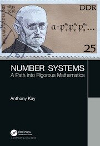- About MAA
- Membership
- MAA Publications
- Periodicals
- Blogs
- MAA Book Series
- MAA Press (an imprint of the AMS)
- MAA Notes
- MAA Reviews
- Mathematical Communication
- Information for Libraries
- Author Resources
- Advertise with MAA
- Meetings
- Competitions
- Programs
- Communities
- MAA Sections
- SIGMAA
- MAA Connect
- Students
- MAA Awards
- Awards Booklets
- Writing Awards
- Teaching Awards
- Service Awards
- Research Awards
- Lecture Awards
- Putnam Competition Individual and Team Winners
- D. E. Shaw Group AMC 8 Awards & Certificates
- Maryam Mirzakhani AMC 10 A Awards & Certificates
- Two Sigma AMC 10 B Awards & Certificates
- Jane Street AMC 12 A Awards & Certificates
- Akamai AMC 12 B Awards & Certificates
- High School Teachers
- News
You are here
Number Systems: A Path into Rigorous Mathematics

Publisher:
Chapman and Hall/CRC
Publication Date:
2021
Number of Pages:
304
Format:
Hardcover
Price:
119.00
ISBN:
9780367180652
Category:
Textbook
[Reviewed by , on ]
Mark Bollman
11/27/2022
I’ve taught 118 different courses in my career, but I’ve never taught a “Transition to Higher Mathematics” kind of course that has become a recognized part of the math majors’ curriculum at many colleges. Part of the reason for that is that my current institution uses a discrete mathematics class to serve that need as well as the needs of our computer science majors simultaneously–but I’ve only ever taught that course as a tutorial for a student who got off-track with her graduation plans. To my mind, that only sort of counts on my list of 118.
Part of the reason is also that I tend to think that the necessary transition to proof-writing skills is better accomplished in context and in concert with some sort of dedicated mathematical content. As a number theorist by training, I think that a number theory course (which my college also doesn’t offer...yet) is an ideal way to serve all of those needs.
Which brings me to Number Systems. This is not exactly a standard elementary number theory textbook, nor is it focused only on proof-writing skills. Rather, it’s a fascinating look at the properties of various number systems, beginning with the natural numbers and wending a fascinating path all the way through to a brief look at the octonions. Along the way, there’s an appreciation for rigor and considerable effort dedicated to aiding the reader in thinking mathematically. With that in mind, it seems like this book would be a great choice for a transition course. Abelian groups and Dedekind cuts both make appearances, providing a possible bridge into later courses in abstract algebra or real analysis
But its appeal is not limited to prospective mathematics majors. Number Systems has the potential to serve as an excellent introduction for college students–at any level; the book grew out of a course for first-year students–to the non-computational side of our subject and to encourage them to think deeply about mathematics in a way that we’d all like to encourage. At the same time, this is also a book that holds a lot of appeal for seasoned professionals who want to revisit some ideas in a more recreational setting. It’s always a pleasure to encounter familiar ideas in a novel setting, and this book does a fine job of providing that pleasure.
Mark Bollman is professor at Albion College
See the publisher's website.
- Log in to post comments




